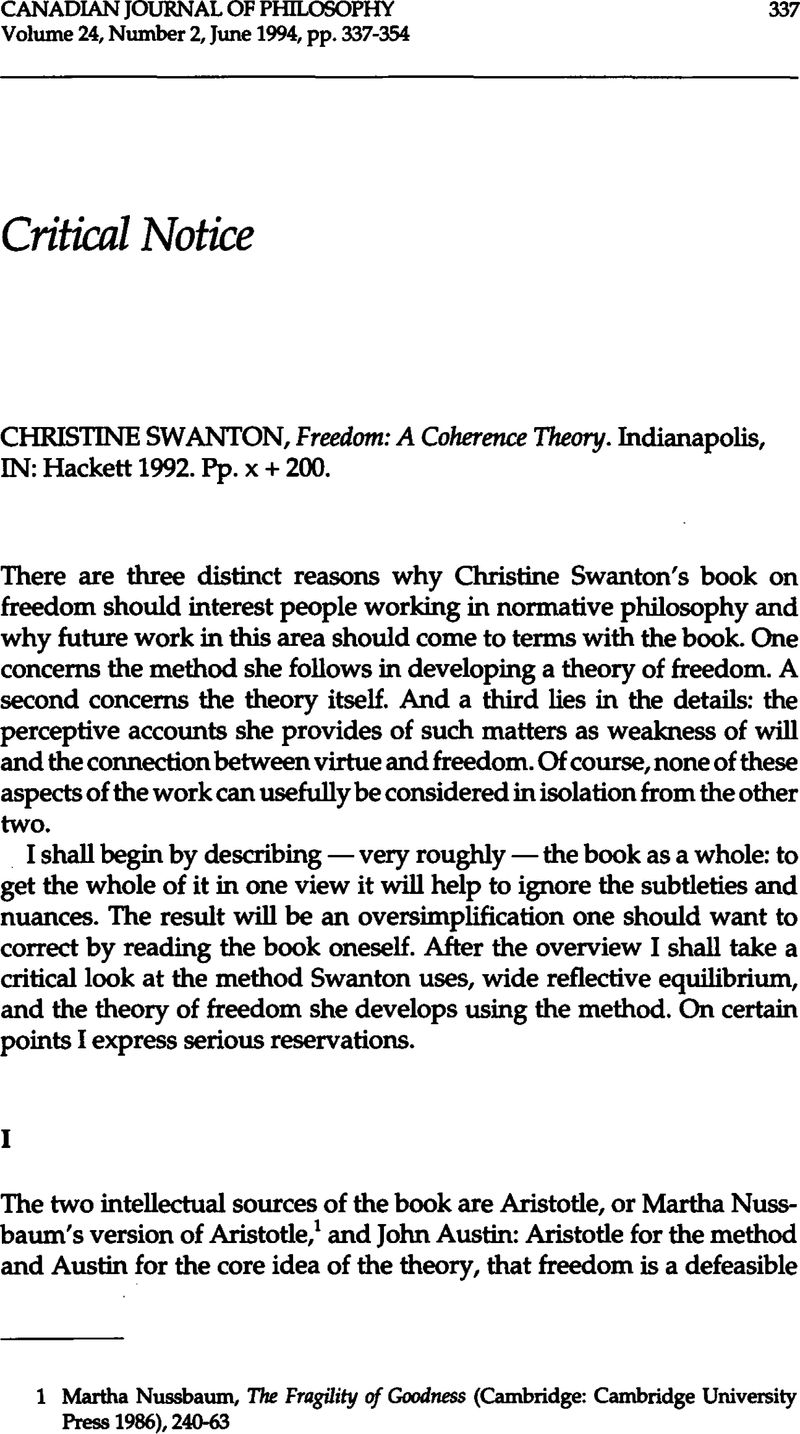No CrossRef data available.
Published online by Cambridge University Press: 01 January 2020

1 Nussbaum, Martha The Fragility of Goodness (Cambridge: Cambridge University Press 1986), 240-63Google Scholar
2 Austin, John ‘A Plea for Excuses,’in Urmson, J.O. and Wamock, G.J.,eds., Philosophical Papers, 3rd ed. (Oxford: Oxford University Press 1979), 180CrossRefGoogle Scholar
3 One candidate for ‘endoxa’ would be the various examples one might produce of ‘what we say.’ Thus, Austin might be said to have been following in Aristotle’s footsteps. Elsewhere in’ A Plea for Excuses’ Austin remarks that ‘ordinary language is not the last word: in principle it can everywhere be supplemented and improved upon and superseded. Only remember, it is the first word’ (ibid., 185).
4 See especially ‘Reflective Equilibrium and Archimedian Points,’ Canadian Journal of Philosophy 10 (1980) 83-103.
5 ‘Grounding Rights and a Method of Reflective Equilibrium,’ Inquiry 25 (1982) 227-306
6 I think that part of the explanation for the excitement some of those who attended Austin’s ‘Saturday mornings’ felt is that they were engaged in an enterprise which was similarly public and social, although here the ‘data’ were gleanings from a dictionary or intimate knowledge of what would be gleaned if one took the trouble to look.
7 The account of weakness of will is extracted from Swanton’s contribution to this journal: ‘Weakness of Will as a Species of Executive Cowardice,’ Canadian Journal of Philosophy 21 (1991) 123-30. I haven’t closely compared the two versions but have the impression that the journal version better conveys her thought. The dependence of her account on Taylor’s notion of strong evaluation seems clearer in the journal version. As I indicate later, I think her account of coercive offers would have been better had she noted the similar way in which an offer’s coerciveness depends on the way it overrides a person’s strong evaluation.
8 It is interesting that in his paper referred to above, Kai Nielsen defines ‘reasonability’ in a way which is suggestive of Dewey’s notion of intelligence or science (Nielsen, 283-7). It is unclear how Nielsen thought being reasonable (in his sense) connects with following the method of wide reflective equilibrium; but it would be surprising if he failed to make the connection.
9 Parent, W.A. ‘Some Recent Work on the Concept of Liberty,’ American Philosophical Quarterly 11 (1974) 149-67Google Scholar
10 Austin, 180
11 The ‘radical’ wing is not interested in just saving the appearances but also in causing new beliefs about freedom to appear.
12 A participant in the Czechoslovakian revolt of 1968 said shortly afterward that he had ‘never felt more free’ than he did while rushing around Prague ensuring that clandestine radio broadcasts continued during that period of crisis (J. Wechsberg, The Voices [Garden City, NY: Doubleday 1969]).
13 It would be nothing more than a verbal trick to claim that any lack of autonomy (or flourishing for that matter) can be represented as a flaw or restraint and that altering the circumstances which explain the person not being more autonomous than she is counts as ‘removal of a restraint.’ This would be to trivialize the claim that freedom is a defeasible notion.
14 Breslow, Lester ‘Health Status Measurement in the Evaluation of Health Promotion,’ Medical Care 27 (1989) s205-16CrossRefGoogle ScholarPubMed
15 ‘Agency and the Self,’ in his Human Agency and Language: Philosophical Papers I (New York: Cambridge University Press 1985) 15-44